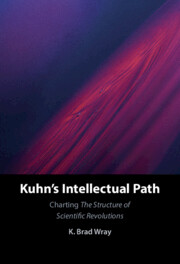7 results
5 - “Textbook Science” before and after Structure
- from Part II - Normal Science and Science Education
-
-
- Book:
- Kuhn's <i>The Structure of Scientific Revolutions</i> at 60
- Published online:
- 05 January 2024
- Print publication:
- 18 January 2024, pp 95-120
-
- Chapter
- Export citation
2 - The Influence of Science Funding Policy on Kuhn’s Structure of Scientific Revolutions
- from Part I - Writing Structure
-
-
- Book:
- Kuhn's <i>The Structure of Scientific Revolutions</i> at 60
- Published online:
- 05 January 2024
- Print publication:
- 18 January 2024, pp 37-52
-
- Chapter
- Export citation

Kuhn's Intellectual Path
- Charting The Structure of Scientific Revolutions
-
- Published online:
- 02 February 2022
- Print publication:
- 30 September 2021
Chapter 1 - What Did Aristotle Teach Kuhn?
- from Part I - The Groundwork for Structure: Harvard 1947 to 1955
-
- Book:
- Kuhn's Intellectual Path
- Published online:
- 02 February 2022
- Print publication:
- 30 September 2021, pp 11-24
-
- Chapter
- Export citation
Chapter 3 - Kuhn and the History of Chemistry
- from Part I - The Groundwork for Structure: Harvard 1947 to 1955
-
- Book:
- Kuhn's Intellectual Path
- Published online:
- 02 February 2022
- Print publication:
- 30 September 2021, pp 50-64
-
- Chapter
- Export citation
Chapter 2 - The Influence of James B. Conant
- from Part I - The Groundwork for Structure: Harvard 1947 to 1955
-
- Book:
- Kuhn's Intellectual Path
- Published online:
- 02 February 2022
- Print publication:
- 30 September 2021, pp 25-49
-
- Chapter
- Export citation
Introduction
-
- Book:
- Kuhn's Intellectual Path
- Published online:
- 02 February 2022
- Print publication:
- 30 September 2021, pp 1-8
-
- Chapter
- Export citation


